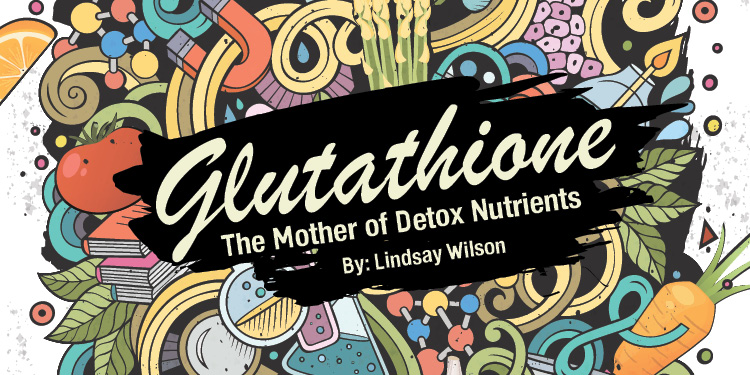


Sign-up for {N}power to get exclusive discounts, newsletters, members-only features, and more!
 Denver - Design District - Alameda and Broadway
Denver - Design District - Alameda and Broadway
368 S Broadway
Denver, CO 80209
United States
 Preferred Store:
Select a Store
Preferred Store:
Select a Store


Thinking about a spring detox? Then, you should also be thinking about glutathione (gloot-a-thigh-own), an antioxidant that may just be the most important nutrient you don’t know about. Glutathione is the “mother” of all antioxidants and one of the few that the human body makes endogenously (that’s a fancy way of saying it’s made inside the body). It is also vitally important for detoxification. While you may typically think of a detox as something you do once or twice a year, glutathione is in it for the long haul, working around the clock, every day, to remove the toxins that can make us sick. Suffice to say, it’s one of the most important nutrients not just for optimal detoxification but also for optimal health. In fact, glutathione is such an important compound that researchers are starting to suggest that levels of this critical nutrient are predictive of longevity.
Glutathione is the second-most abundant molecule in the body, just behind water (a clue of just how important it is to health). It is made up of three amino acids—glycine, cysteine, and glutamate. It is present in every cell but especially concentrated in the liver where it plays a major role in phase II detoxification, the stage in which glutathione binds to toxic molecules to prepare them to be removed from the body. A family of enzymes called glutathione S-transferases (GSTs) is responsible for binding glutathione to these toxins—which can include excess hormones, manmade chemicals, environmental pollutants, pharmaceuticals, and heavy metals—preparing them for excretion. Once it has attached to the toxic molecules, glutathione helps make them water soluble so they can easily be flushed from the body. If it weren’t for glutathione, toxins would back up in our bodies, leading to illness and disease; indeed, depletion of glutathione in humans is linked to diseases like cancer, neurodegenerative disease, and cardiovascular disease.
Glutathione is naturally produced in the body, but aging, poor diet, alcohol, stress, intense exercise, infections, the overuse of antibiotics, chemicals, and other toxins all deplete this important antioxidant. This bombardment from so many angles can make it difficult to maintain healthy glutathione levels, but the good news is that there are plenty of effective ways to naturally boost production of this health promoting nutrient.
Glutathione is found in some foods, but it is not very effective at increasing your levels because it is broken down during digestion, with only a small amount making it to your tissues. That said, there are foods that increase the activity of GST enzymes (those enzymes that help glutathione attach to toxins during detoxification). High-sulfur foods like garlic, onions, broccoli, kale, collards, cabbage, and cauliflower contain the compound sulforaphane, which is the primary inducer of GST enzymes. Broccoli sprouts have also been shown to be an exceptional way of increasing GST enzymes. In addition to eating an abundance of these foods, there are specific nutrients you can take to build your glutathione levels.
 NAC contains cysteine—one of the building blocks of glutathione—and has been shown to effectively increase glutathione reserves in the body. No surprise that it is a standby in emergency rooms where it is used in medical detoxification emergencies such as acetaminophen overdose. A 2016 animal study found that pretreating “aged” cells with NAC before being exposed to a stressor increased glutathione levels in the older cells and helped offset cell death. Alpha lipoic acid. Alpha lipoic acid is another important antioxidant that increases glutathione levels in a couple of ways: it is able to regenerate oxidized (i.e., used) glutathione back to its usable form, in addition to providing a continuous source of cysteine and increasing the uptake of cysteine into cells, where it increases glutathione production within the cell.
NAC contains cysteine—one of the building blocks of glutathione—and has been shown to effectively increase glutathione reserves in the body. No surprise that it is a standby in emergency rooms where it is used in medical detoxification emergencies such as acetaminophen overdose. A 2016 animal study found that pretreating “aged” cells with NAC before being exposed to a stressor increased glutathione levels in the older cells and helped offset cell death. Alpha lipoic acid. Alpha lipoic acid is another important antioxidant that increases glutathione levels in a couple of ways: it is able to regenerate oxidized (i.e., used) glutathione back to its usable form, in addition to providing a continuous source of cysteine and increasing the uptake of cysteine into cells, where it increases glutathione production within the cell.
The methylated, or active, forms of these B vitamins are necessary for the body to synthesize glutathione. Folate also directs cysteine to glutathione production and away from homocysteine production. Look for folate in the form of 5-methyltetrahydrofolate, B6 in the form of P5P, and B12 in its active form of methylcobalamin.
Other nutrients that are required to maintain healthy glutathione levels in the body include magnesium, selenium, and vitamin C.
While it’s easy to think about a detox as something you do occasionally to push the “reset” button, remember that our bodies are bombarded with toxins every day, from a variety of sources, and need to be detoxed accordingly. Glutathione is there to do that job, working ceaselessly to move toxins out of our bodies to help us maintain good health. Show your body some love by giving it the nutrients it needs to make this vital molecule and keep your detox machinery running smoothly, not just in the spring, but all year long!



Sign-up for {N}power to get exclusive discounts, newsletters, members-only features, and more!
